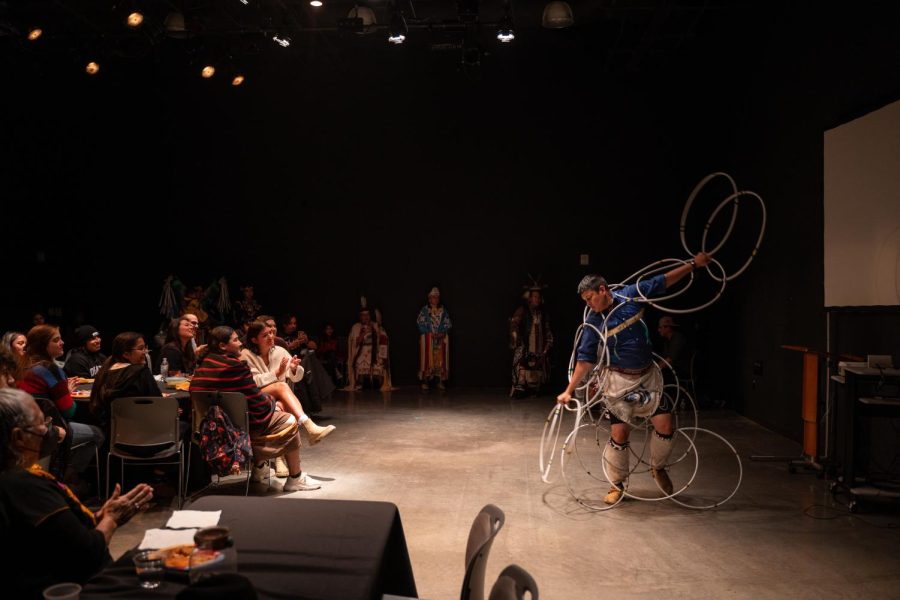Student organization holds anti-Thanksgiving feast to bring attention to Indigenious history
An Indigenous dancer performs in the WCP Blackbox at anti-Thanksgiving event hosted by Latinos Studies UT on Nov. 17, 2022.
November 18, 2022
On Thursday, the Native American and Indigenous Collective held an anti-Thanksgiving feast at the William C. Powers Jr. Student Activity Center.
The United States proclaimed Thanksgiving a public holiday in 1789, according to the House of Representatives archives. While many may associate the holiday with festive feathers, turkey and jolly pilgrims, the history of Thanksgiving Day is a sad one for the Native American community, said co-director of the collective Raven Price-Smith. The Thanksgiving tradition traces back to the U.S.’ history of colonialism, when Europeans invaded Native lands.
“For us it’s not a day of giving thanks, it’s a day of mourning,” said co-director of the collective Brianelly Flores.
The anti-Thanksgiving event provided a meal and place of gathering for Native American-identifying members of the University community to come together. Dancers from Great Promise for American Indians, a nonprofit organization benefiting Indigenous tribes, performed a cultural powwow dance at the event.
Price-Smith said that a lack of understanding of Native history within the UT community bears a heavy weight on Native American and Indigenous students.
“We’ve literally come across people (at UT) that didn’t even know Native Americans still existed,” architectural engineering sophomore Price-Smith said. “They thought they were someone that was extinct.”
According to fall University figures, 0.1% of UT students identify as American Indians or Alaskan Natives.
“Sometimes it can feel so lonely and sometimes it feels like you’re the only person who is like you,” Flores said.
The group held the anti-Thanksgiving feast to bring attention to the tragic history of colonization of all Indigenous groups and to share the culture of various Native communities, Flores said.
“There’s this one saying…’Kill the Indian, save the man,’” Price-Smith said. “That was basically the ideology of these White settlers — when they approached Native American people they wanted to kill our beliefs.”
Price-Smith said she does not blame anyone for celebrating the holiday as a way to gather with friends and family, but would like the community to acknowledge and respect the history behind it.
Flores and Price-Smith encourage members of the University to learn more about the origins of Thanksgiving and its colonialism instead of relying on the Native community to educate them.
“This entire notion of Thanksgiving is very misconstrued and I feel like a lot of people don’t know the actual truth behind Thanksgiving, and how we are still being affected by colonialism today,” Price-Smith said.
November is Native-American Heritage month and a good time to learn about the Indigenous history that the public school systems often fail to teach, Flores said.












